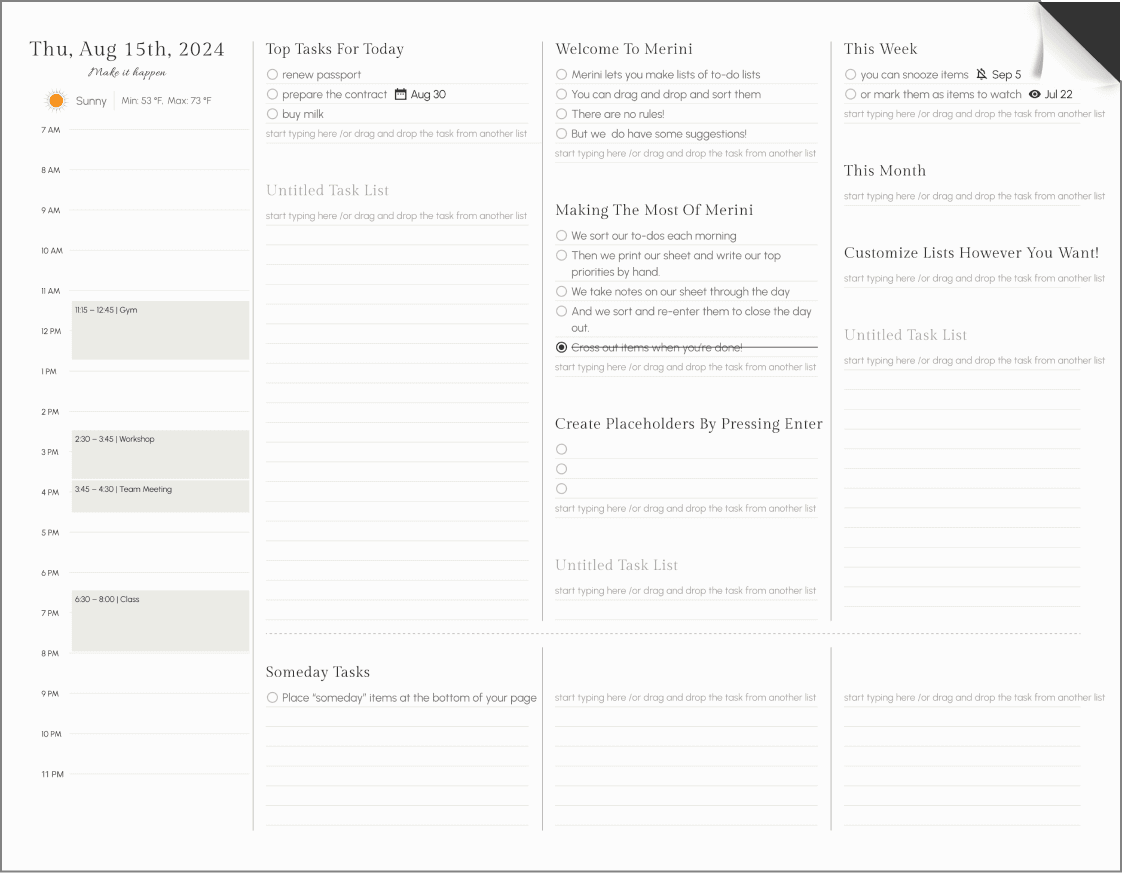Aug 21, 2024
The Simple Rules for Getting Productive
Merini Team



We read the productivity books so you don't have to! The simple things are the things that work. Here's our roundup from Nir Eyal's Indistractable, David Allen's Getting Things Done, Jake Knapp and John Zeratsky's Make Time: How to Focus on What Matters every day.
Time Box your top thing Reserve time to work on your #1 top thing every day. While to-do lists can grow indefinitely (email is a to-do list made by other people), your time is limited. You don't need to time box everything, just start with your top thing.
Write it down Write down your top thing by hand. Writing by hand helps strengthen neural pathways and will make it easier to keep your #1 priority in mind.
Make time to make time Save time (the end or the beginning of the workday) to review and think about what your next #1 top thing is. (And also make sure to plan time for it. See #1 above.)
Get it in one place You probably have many "intake queues" where to-do's come from. Email is the most insidious, but you may have work AND personal email, chat messages, (work and personal again), text message, meeting action items, and honey-do lists pinned to the fridge. When you consolidate these in one place, it relieves mental burden to constantly check across all of them.
Be Clear on the Next Step Make sure your to-do lists (which you should recognize based on your time bound capacity can't be infinite) have clear, actionable, next steps to take. For example, "car" is not actionable, but "take car to the mechanic to change brake pads" is.
Focus Buddy While cutting external distractions (i.e. turning off notifications, taking Instagram off your smartphone) will help, many distractions are internal, and really just procrastinating, rather than working through the discomfort of needing to concentrate. Focus buddies (like a gym buddy, but for concentrating) and other mindfulness and awareness techniques help develop concentration as a skill.
Reflect and Iterate Periodically reflect on how things are going. If you're not getting your #1 thing done, ask why, and try again!
We read the productivity books so you don't have to! The simple things are the things that work. Here's our roundup from Nir Eyal's Indistractable, David Allen's Getting Things Done, Jake Knapp and John Zeratsky's Make Time: How to Focus on What Matters every day.
Time Box your top thing Reserve time to work on your #1 top thing every day. While to-do lists can grow indefinitely (email is a to-do list made by other people), your time is limited. You don't need to time box everything, just start with your top thing.
Write it down Write down your top thing by hand. Writing by hand helps strengthen neural pathways and will make it easier to keep your #1 priority in mind.
Make time to make time Save time (the end or the beginning of the workday) to review and think about what your next #1 top thing is. (And also make sure to plan time for it. See #1 above.)
Get it in one place You probably have many "intake queues" where to-do's come from. Email is the most insidious, but you may have work AND personal email, chat messages, (work and personal again), text message, meeting action items, and honey-do lists pinned to the fridge. When you consolidate these in one place, it relieves mental burden to constantly check across all of them.
Be Clear on the Next Step Make sure your to-do lists (which you should recognize based on your time bound capacity can't be infinite) have clear, actionable, next steps to take. For example, "car" is not actionable, but "take car to the mechanic to change brake pads" is.
Focus Buddy While cutting external distractions (i.e. turning off notifications, taking Instagram off your smartphone) will help, many distractions are internal, and really just procrastinating, rather than working through the discomfort of needing to concentrate. Focus buddies (like a gym buddy, but for concentrating) and other mindfulness and awareness techniques help develop concentration as a skill.
Reflect and Iterate Periodically reflect on how things are going. If you're not getting your #1 thing done, ask why, and try again!
Related Articles
Get started with Merini

Get started with Merini


